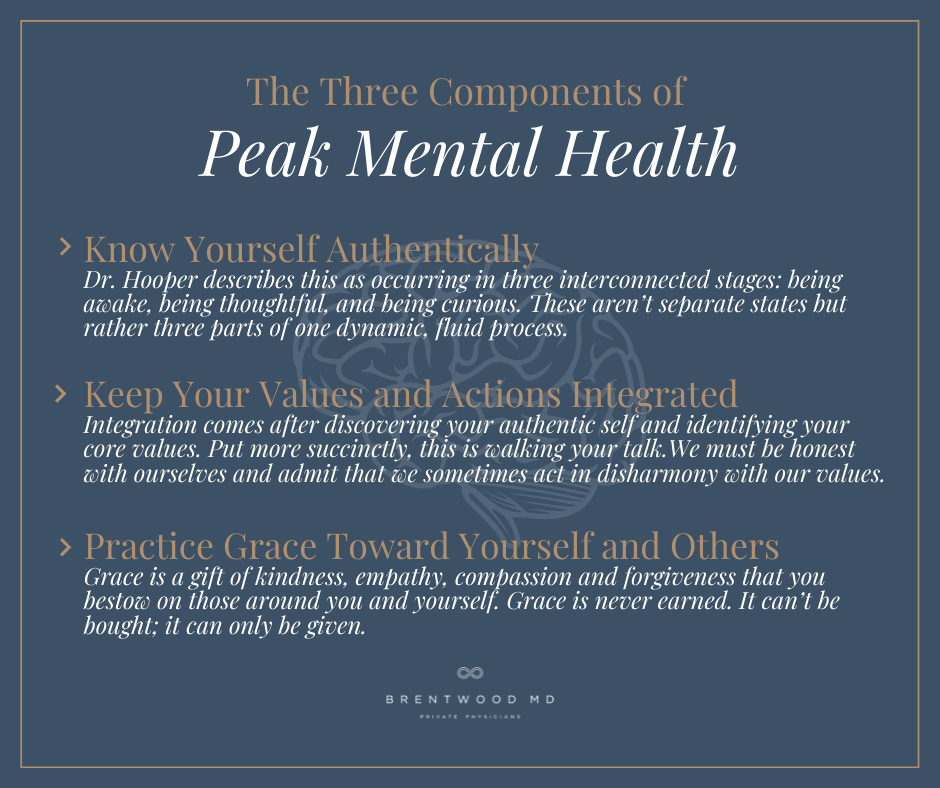Download file | Play in new window | |
Mental health is simultaneously one of the most important and yet poorly understood topics in our society. It’s an issue I try to focus on whenever possible, in both my professional practice and my personal life. The reality is that there are many misconceptions out there about emotional well-being and achieving peak mental health.
In my ongoing conversations about this topic, I sat down again with clinical psychologist and minister Dr. Hooper to discuss peak mental health.
The Three Components of Peak Mental Health
Peak mental health isn’t simply the opposite of mental illness. Mental illnesses are health conditions that affect our mental and emotional well-being. But not having a mental illness doesn’t necessarily mean you’re operating at peak mental health.
Peak mental health isn’t a static achievement but a dynamic journey of self-discovery. It’s living with yourself and others in a way that’s authentic, ethically integrated and gracious. We’ll unpack each of these three components in this post.
Know Yourself Authentically
The first component of peak mental health — to know yourself authentically — can sound rather abstract. What does it mean to know your authentic self?
Dr. Hooper describes this as occurring in three interconnected stages: being awake, being thoughtful and being curious. These aren’t separate states but rather three parts of one dynamic, fluid process.
Be Awake
Being awake means being open to a full understanding of what principles and values are really important to you in your life. Life is a journey, and the most important part of this journey is not the origin point or the destination but the long, winding highway in between. That’s where life is really lived.
Your life journey is an ongoing evaluation of and interaction with your true inner self and the external world. Pay attention to your inner self. Be awake to your own values and to what’s important to you. Take notice when something you do or say seems to conflict with those values.
Be Thoughtful
When you’re awake to noticing the values within yourself, consider them. Ask yourself questions. Did my action correspond to my values? Did my words match my true inner self? Did I come to these values myself, or were they handed to me by someone else?
Once you can honestly answer questions like these, you have a roadmap — a blueprint — for identifying when you’re not living congruently with your inner values. This will help you make course corrections along the way.
Be Curious
Being curious means that you open your mind to self-evaluation without judgment. Curiosity is simply seeking to understand the source of your actions and how they relate to your inner values.
Take every discovery as a data point that can help you on your journey. Knowing yourself authentically doesn’t mean being perfect; it means being perfectly willing to know who you are in the moment.
Keep Your Values and Actions Integrated
The second component of peak mental health is keeping your actions integrated with your values. Integration comes after discovering your authentic self and identifying your core values. Put more succinctly, this is walking your talk.
We must be honest with ourselves and admit that we sometimes act in disharmony with our values. The challenge here is not to condemn yourself for it. This is part of everyone’s journey. Instead, recognize and learn from these moments of cognitive dissonance so that you can move toward peak mental health.
Audit Yourself for Friction
We’re all works in progress who must course-correct during our journeys and continually grow along the way. A big part of integration — keeping your values and actions aligned — is identifying any points of friction between your walk and your authentic self and working on them. When you notice friction, don’t ignore it; instead, dig in, discover and learn.
Allow Yourself To Heal
We all need time to heal from difficult life experiences and past trauma. Processing and moving past trauma is a herculean task, a lifelong journey for some. If you’re suffering from PTSD or other adverse effects from trauma, seek out a therapist who can provide you the space and help for the healing you need.
Practice Grace Toward Yourself and Others
Grace is a gift of kindness, empathy, compassion and forgiveness that you bestow on those around you and yourself. Grace is never earned. It can’t be bought; it can only be given.
Practicing grace is a hallmark of peak mental health. Without it, we can resort to the self-defense mechanisms of judgment and hostility toward others. Perhaps they genuinely wronged us, or perhaps the offense was minor. Regardless, without grace, we may cast people aside unnecessarily and burn bridges prematurely.
What Are The Consequences of Not Fixing These?
Achieving peak mental health is part of the grand character arc of your life. There are going to be some low points along the way. These may come as natural consequences of procrastinating the necessary work on yourself. It’s all too easy to ignore our weaknesses and just kick the can further down the road.
What Happens Without Authenticity?
The primary consequence of failing to know your authentic self is a lack of integration. Integration is when your deepest values and your daily actions and behaviors are aligned and walking hand in hand with each other.
To be integrated is to live with full conscious participation in everything you do. To be dis-integrated is to live without self knowledge and with constant friction between what you do and the values of your inner self.
What Happens Without Integration?
A lack of integration often results when someone habitually refuses to look at and course-correct inauthentic lifestyle choices and behaviors. They get off track, unwoven, not wanting to address the source of the friction they feel, instead looking for ways to temporarily soothe it.
People in these situations often turn to substance abuse or other compulsive behaviors to soothe the unpleasant pressure of cognitive dissonance. Unfortunately, self-medicating in this way often leads to further dis-integration, loss of positive relationships or pursuits, and sub-optimal mental health.
It’s a frightening downward spiral that plagues even some of the most successful people. Given enough pressure, a failure to live authentically can cause a person to fall apart.
What Happens Without Grace?
Holding onto resentment and injury holds you back on your journey to peak mental health. If instead, you approach others with respectful curiosity, grace and a willingness to forgive, you move closer to an authentic form of love, which Dr. Hooper defines as to want for and work for the best for another.
Having grace with others doesn’t mean you can’t objectively evaluate your relationships. If necessary, you may need to move on from a relationship, but you can move on graciously. Otherwise, you become tied to someone else’s negative behaviors and end up stuck in a cycle of resentment and bitterness.
Grace allows you to forgive others, forgive yourself and grow.
Starting the Journey: A Conclusion
Attaining peak mental health is an ongoing discipline, and to work toward it, you need the right cognitive tools. To recap, the three major tools in the pursuit of peak mental health are finding your authentic self, integrating your values with your behaviors, and practicing grace.
Improving yourself and finding peak mental health is a creative process, a form of art — the art of living. You may never reach an endpoint, and that’s okay. Participating in the process is what’s important.
For more information on starting this journey and finding a spiritually oriented psychotherapist (someone who values connectedness and holistic emotional health), visit Dr. Hooper’s website.

Dr. Aaron Wenzel is a concierge physician specializing in the care of fast-moving entrepreneurs, executives, and public figures in the Nashville, TN area. Dr. Wenzel’s diverse life experience and extensive training in family medicine, emergency care, nutrition, and hormone replacement therapies give him the unique platform to provide unmatched care for his patients.








